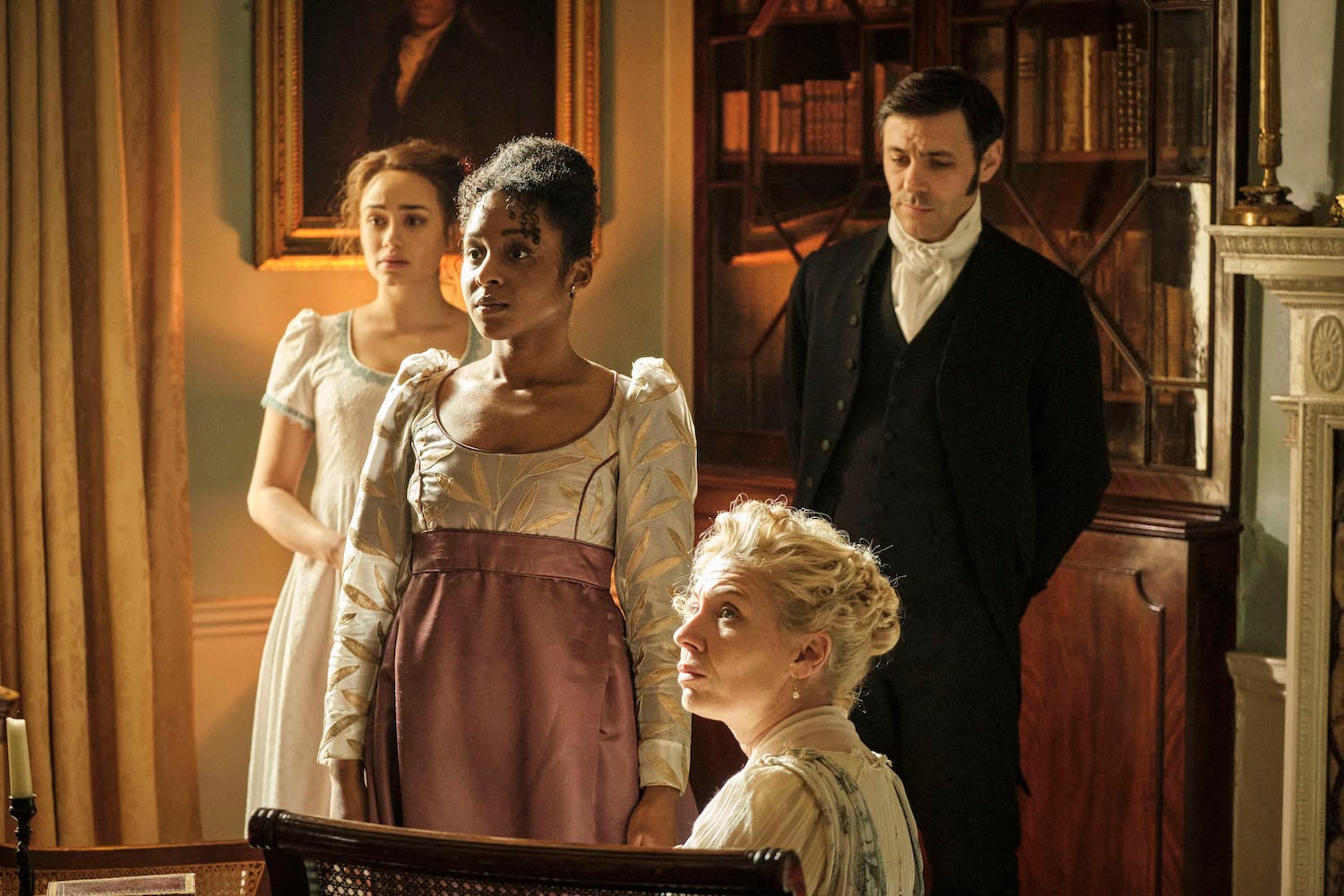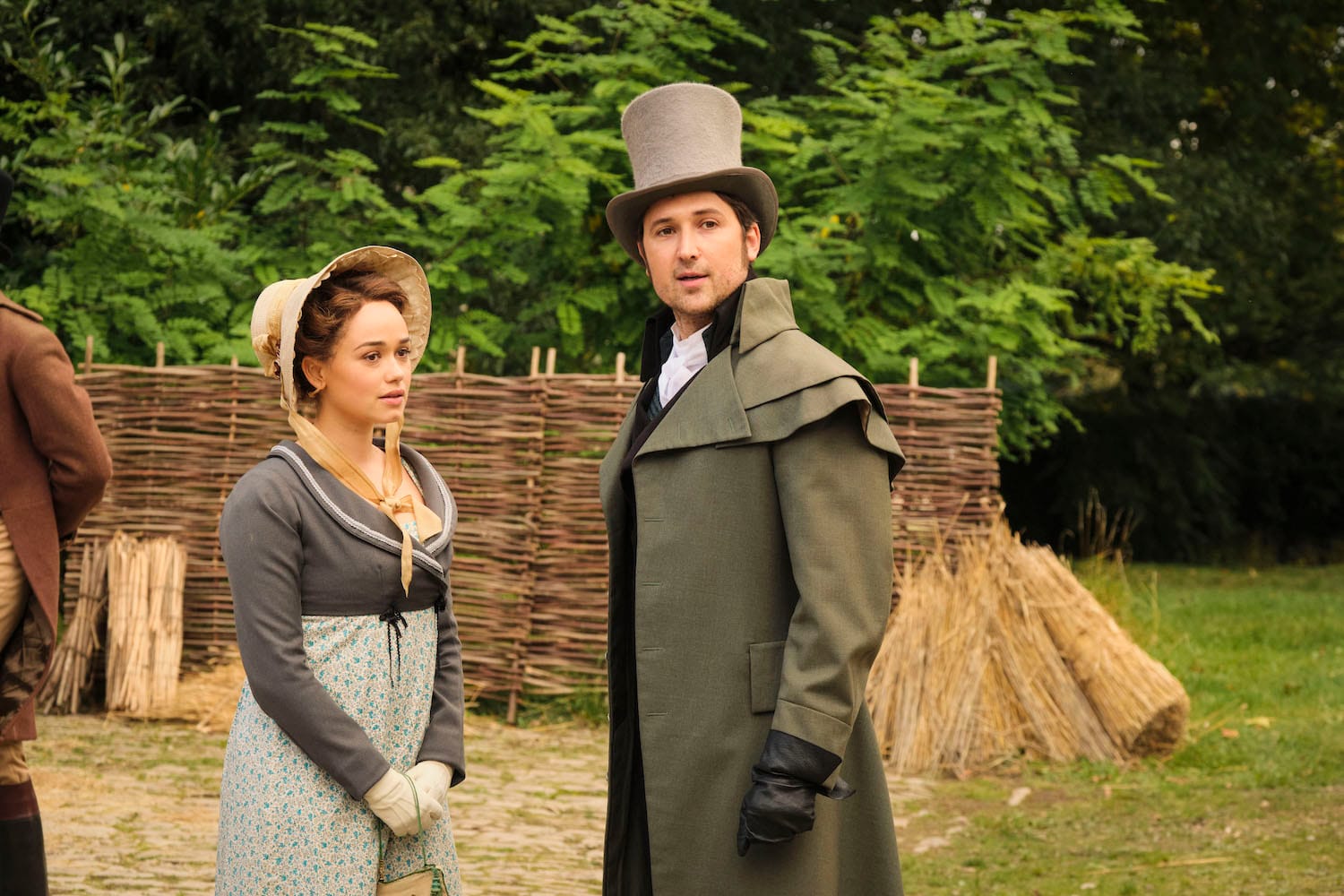In 'Sanditon' Season 3's Third Episode, Georgiana Gets Her Day In Court

Since the second and third seasons of Sanditon were filmed back to back, one has to assume that the folks in charge of the series knew quite early on that Season 3 would be the show's final outing. Even though there had to be ample time to plan its arcs, the season has struggled with pacing issues throughout its early episodes. But where the premiere spent most of its time on table-setting with little forward narrative momentum, Season 3's third installment rockets through what feels like a half dozen plots all at once, making it hard to judge if they are given the depth they deserve.
Sanditon's final season is just six episodes long and has a lot of ground to cover. And yet, it introduced multiple new characters and decided that several supporting roles deserved a more significant presence in these final installments.* While this season (heck, this specific episode) is still trying to do entirely too much, it's hard not to enjoy the breakneck speed with which these many stories unfold here.
*(This is an opinion it is perfectly fine to have, but certainly not one I share. Think about what a final season where the screentime that's being spent on Lady Susan, Lady Denham's new boyfriend, the vicar's sister, Dr. Fuchs, or the entirety of the Montrose clan was instead given to Charlotte, Georgiana, and Augusta. Just saying!)
If what you want is some sense of real interiority for the series' heroine, a better understanding of her complex feelings about Colbourne, or an explanation of why she's determined to marry poor, doomed Ralph, that isn't a vague sense of "duty" (particularly when so much of Charlotte's presence in Sanditon in the first place has always been about her living a life beyond that which has been expected of her), you will be disappointed. But if you want to watch many beautiful people pine over one another in increasingly dramatic fashion, this episode has you covered, from clifftop romantic confessions to star-crossed yearning and everything in between.

Crystal Clarke, Rose Williams, Liam Garrigan, and Kate Ashfield in "Sanditon" Season 3
The bulk of the hour revolves around Georgiana's court case — the wheels of justice grind exceedingly quickly in mid-19th-century England — as she is forced to face her ex (and apparent cousin) Charles Lockhart, who insists he deserves her fortune for a variety of noxious reasons. He claims there's no way Georgiana's father cared about her, questions her paternity, and cruelly reveals Georgiana's father sold her mother to another plantation. In one particularly loathsome moment, he even asserts that, as the daughter of a likely still-enslaved person, Georgiana is still a slave, thus incapable of inheriting or owning property in her own right.
Of course, this is all very high drama and Crystal Clarke performs wonderfully through several harsh and difficult scenes. (Her speech to the judge asserting her humanity is particularly great.) Georgiana emerges victorious but publicly humiliates herself to do so, leaving a bit of a bitter taste in one's mouth. Here's hoping we at least get more scenes like the one she shares with Colbourne's housekeeper, Mrs. Wheatley, which recognizes that even with all she has technically "won," she has still lost something important, too, that's worth mourning.
But I wish Sanditon had done more than speedrun through this subplot. It was a perfect opportunity to finally give Georgiana the story she deserved. Much like The Confessions of Frannie Langton, Sanditon is set between when England officially abolished the international slave trade in 1807 and the Slavery Abolition Act in 1833. (The judge says no one can be considered a slave on English shores but has no comment about what might be happening in the colonies.) As a woman of significant means in England who her father acknowledged, Georgiana's experience is quite different from most Black women of the time; many remained servants, exploited, and forced to work without pay. The lawsuit storyline would have provided a unique opportunity to explore what that meant for her specific experience and to educate viewers about what life was like for most Black Britons during this period.
The episode ends with a long-awaited kiss between Charlotte and Colbourne; however, it focuses on every relationship but theirs. Instead, Lady Denham reconnects with an ex we'd never heard of before this season, rather than watching its leading lady sort out her feelings about still loving a man who hurt her. It's exciting that Confirmed Bachelor Arthur Parker may not be a confirmed bachelor for much longer; it's boggling to expect the final three episodes of a show which barely acknowledged LGBTQ people to be somehow equipped to tell a satisfying story about a possible romance between two reasonably affluent gay men in 19th century England. (Will Georgiana keep fake dating her bestie's new man so they can all be together with no one the wiser? Stay tuned.)
However, the most frustrating romance award once again has to go to the inexplicable whatever the hell that is happening between Edward Denham and Augusta Markham. On paper, this storyline hits all the tropes period drama romance fans love: flirty banter, star-crossed attraction, and a mean male relative denying the would-be lovers to each other. We should be swooning over this!
But it's like Sanditon forgot who was taking part in this story: Edward, a man we've watched manipulate and do actual harm to multiple women throughout the series, who gaslit and pushed his sister toward madness and never expressed much in the way of genuine regret or apology for any of those choices. Is this a character who should get a happy ending or deserves the chance to drag Augusta (one of the show's best characters) down with him?

Rose Williams and Ben Lloyd Hughes in "Sanditon" Season 3
Fans of the Heybourne relationship will likely be over the moon about this episode's final sequence, which finally sees Alexander confess that he's in love with Charlotte and ask her to stay with him in Sanditon rather than go home to marry Ralph. The setting, the outfits, the book of Keats poetry Charlotte happens to be holding (bearing her fiance's inscription no less!), it's all peak angsty period drama. It's the kind of stuff anybody who loves this genre is automatically drawn to. We're suckers for it!
But while the show motivates Colbourne — his busybody brother finally tells him what everyone around him knows, that he's in love with Charlotte — it gives us very little about Charlotte's thoughts and feelings. (Par for the course for this relationship, sadly.) Why is she so determined to deny her own heart? Is she still angry Colbourne called off whatever was going on between them in the first place? Is she afraid of trusting a man who's been so cavalier with her feelings? Why does she feel she must honor her father's wishes and marry a boy she doesn't love? Is she that willing to ruin his life in the process as well as her own?
(I think we can all agree that poor Ralph, who is genuinely caring and accommodating toward Charlotte, deserves a lot better treatment than this.)
We don't know because Sanditon Season 3 is strangely reluctant to spend time with Charlotte and repeatedly refuses to show us much about her point of view. (Before the last scene with Colbourne on the cliffs, Charlotte's presence in this episode is almost entirely secondary.) Instead, we get to hear plenty of other people's thoughts about the relationship status, ranging from those that know Charlotte (Lady Susan and Mrs. Parker) and those that don't (Samuel). Where's our heroine's voice in this? Hasn't she earned the right to speak for herself? And don't we, as viewers who care about her, deserve to hear what she has to say?




